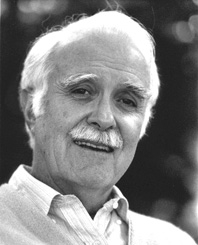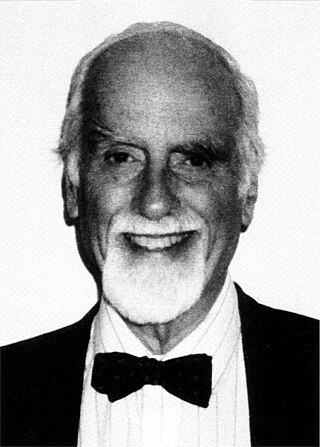Related Research Articles
Personality psychology is a branch of psychology that examines personality and its variation among individuals. It aims to show how people are individually different due to psychological forces. Its areas of focus include:
Personality is any person's collection of interrelated behavioral, cognitive, and emotional patterns that comprise a person’s unique adjustment to life. These interrelated patterns are relatively stable, but can change over long time periods.
Need for achievement is a person's desire for significant accomplishment, mastery of skills, control, or high standards. The psychometric device designed to measure need-for-achievement, N-Ach, was popularized by the psychologist David McClelland. A need for achievement figures as a secondary or psychogenic need in Henry Murray's system of needs.
The Thematic Apperception Test (TAT) is a projective psychological test developed during the 1930s by Henry A. Murray and Christiana D. Morgan at Harvard University. Proponents of the technique assert that subjects' responses, in the narratives they make up about ambiguous pictures of people, reveal their underlying motives, concerns, and the way they see the social world. Historically, the test has been among the most widely researched, taught, and used of such techniques.
A need is dissatisfaction at a point of time and in a given context. Needs are distinguished from wants. In the case of a need, a deficiency causes a clear adverse outcome: a dysfunction or death. In other words, a need is something required for a safe, stable and healthy life while a want is a desire, wish or aspiration. When needs or wants are backed by purchasing power, they have the potential to become economic demands.
In psychology, a projective test is a personality test designed to let a person respond to ambiguous stimuli, presumably revealing hidden emotions and internal conflicts projected by the person into the test. This is sometimes contrasted with a so-called "objective test" / "self-report test", which adopt a "structured" approach as responses are analyzed according to a presumed universal standard, and are limited to the content of the test. The responses to projective tests are content analyzed for meaning rather than being based on presuppositions about meaning, as is the case with objective tests. Projective tests have their origins in psychoanalysis, which argues that humans have conscious and unconscious attitudes and motivations that are beyond or hidden from conscious awareness.
Content theory is a subset of motivational theories that try to define what motivates people. Content theories of motivation often describe a system of needs that motivate peoples' actions. While process theories of motivation attempt to explain how and why our motivations affect our behaviors, content theories of motivation attempt to define what those motives or needs are. Content theory includes the work of David McClelland, Abraham Maslow and other psychologists.

In trait theory, the Big Five personality traits are a group of five characteristics used to study personality:
Political psychology is an interdisciplinary academic field, dedicated to understanding politics, politicians and political behavior from a psychological perspective, and psychological processes using socio-political perspectives. The relationship between politics and psychology is considered bidirectional, with psychology being used as a lens for understanding politics and politics being used as a lens for understanding psychology. As an interdisciplinary field, political psychology borrows from a wide range of disciplines, including: anthropology, economics, history, international relations, journalism, media, philosophy, political science, psychology, and sociology.

Henry Alexander Murray was an American psychologist at Harvard University. From 1959 to 1962, he conducted a series of psychologically damaging and purposefully abusive experiments on minors and undergraduate students. One of those students was Ted Kaczynski, later known as the Unabomber.
Dependency need is "the vital, originally infantile needs for mothering, love, affection, shelter, protection, security, food, and warmth."
Developed by psychologist and University of Washington professor Allen L. Edwards, the Edwards Personal Preference Schedule (EPPS) is a forced choice, objective, non-projective personality inventory. The target audience in between the ages of 16-85 and takes about 45 minutes to complete. Edwards derived the test content from the human needs system theory proposed by Henry Alexander Murray, which measures the rating of individuals in fifteen normal needs or motives. The EPPS was designed to illustrate relative importance to the individual of several significant needs and motives. It is useful in counseling situations when responses are reviewed with the examinee.

Robert Hogan is an American personality psychologist and organizational psychologist known for developing socioanalytic theory, which fuses psychoanalytic theory, role theory, and evolutionary theory. Hogan is the president of Hogan Assessment Systems, which he co-founded in 1987. He is the author of three widely used personality inventories—the Hogan Personality Inventory; the Hogan Development Survey; and the Motives, Values, Preferences Inventory—along with more than 300 scholarly articles, chapters, and books.

John William Atkinson, also known as Jack Atkinson, was an American psychologist who pioneered the scientific study of human motivation, achievement and behavior. He was a World War II veteran, teacher, scholar, and long term member of the University of Michigan community.
Managerial psychology is a sub-discipline of industrial and organizational psychology that focuses on the effectiveness of individuals and groups in the workplace, using behavioral science.
The need for affiliation (N-Affil) is a term which describes a person's need to feel a sense of involvement and "belonging" within a social group. The term was popularized by David McClelland, whose thinking was strongly influenced by the pioneering work of Henry Murray, who first identified underlying psychological human needs and motivational processes in 1938. It was Murray who set out a classification of needs, including achievement, power and affiliation, and placed these in the context of an integrated motivational model. People with a high need for affiliation require warm interpersonal relationships and approval from those with whom they have regular contact. Having a strong bond with others make a person feel as if they are a part of something important that creates a powerful impact. People who place high emphasis on affiliation tend to be supportive team members, but may be less effective in leadership positions. A person who takes part in a group, whether it be a movement or project, helps create a push towards a sense of achievement and satisfaction for the individual and the whole.

David Clarence McClelland was an American psychologist, noted for his work on motivation Need Theory. He published a number of works between the 1950s and the 1990s and developed new scoring systems for the Thematic Apperception Test (TAT) and its descendants. McClelland is credited with developing Achievement Motivation Theory, commonly referred to as "need for achievement" or n-achievement theory. A Review of General Psychology survey published in 2002, ranked McClelland as the 15th most cited psychologist of the 20th century.
Need theory, also known as Three needs theory, proposed by psychologist David McClelland, is a motivational model that attempts to explain how the needs for achievement, affiliation, and power affect the actions of people from a managerial context. This model was developed in the 1960s, two decades after Maslow's hierarchy of needs was first proposed in the early 1940s. McClelland stated that every person has these three types of motivation regardless of age, sex, race, or culture. The type of motivation by which each individual is driven derives from their life experiences and the opinions of their culture. This need theory is often taught in classes concerning management or organizational behaviour.
In 1938, the American psychologist Henry Murray developed a system of needs as part of his theory of personality, which he named personology. Murray argued that everyone had a set of universal basic needs, with individual differences among these needs leading to the uniqueness of personality through varying dispositional tendencies for each need; in other words, a specific need is more important to some people than to others.
Goal orientation, or achievement orientation, is an "individual disposition towards developing or validating one's ability in achievement settings". In general, an individual can be said to be mastery or performance oriented, based on whether one's goal is to develop one's ability or to demonstrate one's ability, respectively. A mastery orientation is also sometimes referred to as a learning orientation.
References
- ↑ Costa, Paul T.; McCrae, Robert R. (1988). "From catalog to classification: Murray's needs and the five-factor model". Journal of Personality and Social Psychology. 55 (2): 258–265. doi:10.1037/0022-3514.55.2.258.
- ↑ NetMBA. "McClelland's Theory of Needs". 2010
- ↑ Teglasi, Hedwig. "Essentials of TAT and Other Storytelling Assessments". Hoboken: John Wiley & Sons, Inc. 2010
- ↑ Wildman, R.W., & Wildman, R.W. II. (1975). An investigation into the comparative validity of several diagnostic tests and test batteries. Journal of Clinical Psychology, 31, 455-458
- ↑ Lilianfeld, S., Wood, J., & Garb, H. The scientific status of projective techniques. Psychological Science in the Public Interest.
- 1 2 Meyer, G. The reliability and validity of the Rorschach and Thematic Apperception Test compared to other psychological and medical instruments.
- ↑ Gruber, N. & Kreuzpointner, L. Measuring the Reliability of Picture Story Exercises like the TAT. PLOS
- ↑ Chusmir, L. & Parker, B. (1984). Dimensions of need for power: Personalized vs. socialized power in female and male managers. Sex Roles.
- ↑ Conger, Jay & Kanungo, Rabindra. "The Empowerment Process: Integrating Theory and Practice" 1988
- ↑ Larson, R. & Buss, D. (2010). Personality psychology: domains of knowledge about human nature. New York, NY: McGraw-Hill.
- ↑ Jenkins, SR. (1991). Need for power and women's careers over 14 years: structural power, job satisfaction, and motive change. Journal of Personality and Social Psychology.
- 1 2 Chusmir, L. & Parker, B. (1984). Dimensions of need for power: Personalized vs. socialized power in female and male managers. Sex Roles, 11, 759-769.
- ↑ Levinson, H. Managing and Directing Your Career.
- 1 2 Worell, J. [Ed.] The Encyclopedia of Women and Gender: Sex Similarities and Differences, Volume 1.
- ↑ Cho, Jinsook; Lee, Jinkook (1 January 2006). "An integrated model of risk and risk-reducing strategies". Journal of Business Research. 59 (1): 112–120. doi:10.1016/j.jbusres.2005.03.006.
- ↑ Carland, James W. III; Carland, James W. Jr.; Carland, Jo Ann C.; Pearce, James W. (1 March 1995). "Risk Taking Propensity among Entrepreneurs, Small Business Owners and Managers". Journal of Business and Entrepreneurship. 7 (1): 15.
- 1 2 Duane P. Schultz; Sydney Ellen Schultz (2008). "Chapter 5 – Henry Murray: Personology" (PDF). Theories of Personality (PDF). Cengage Learning. ISBN 978-0-495-50625-6. Archived from the original (PDF) on 2017-02-07. Retrieved 2017-02-07.